Key takeaways:
- The social innovation marketplace thrives on collaboration and diverse voices, which drive impactful change in addressing societal challenges.
- Effective youth mentoring relies on trust, empathy, and fostering a growth mindset, enabling youths to overcome challenges and build confidence.
- Sharing personal experiences, including failures, with mentees fosters connection and helps them navigate their own journeys, creating a legacy of empowerment.
- Measuring mentorship impact involves observing qualitative growth in mentees, such as increased confidence and successful goal achievement, rather than just relying on quantitative data.
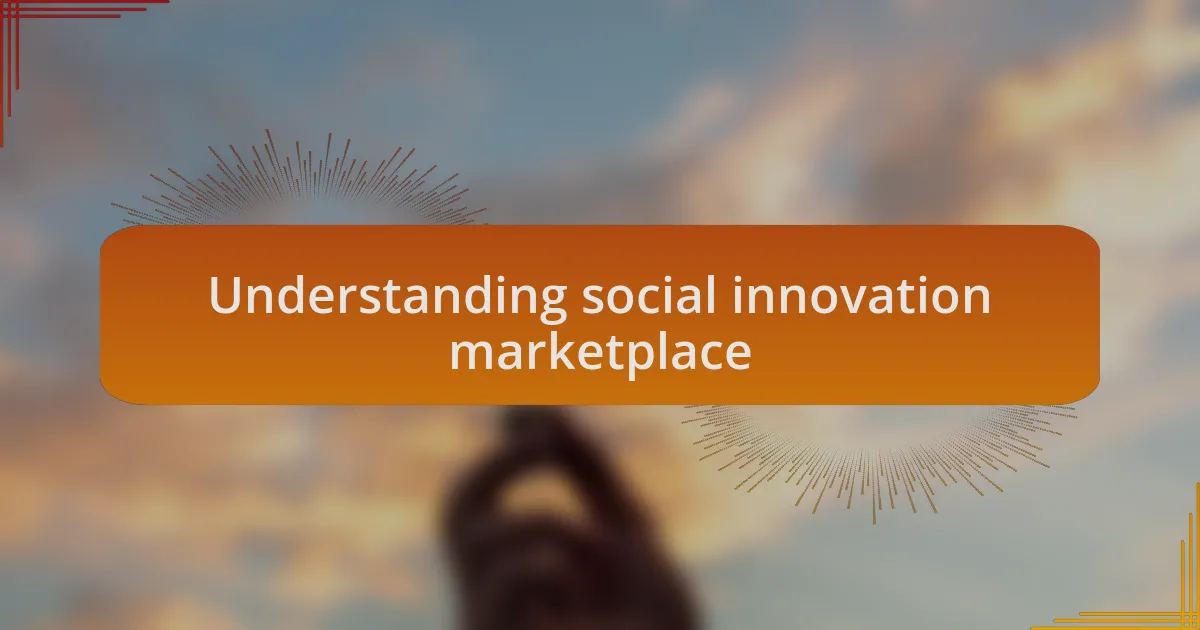
Understanding social innovation marketplace
The social innovation marketplace is a vibrant ecosystem where ideas come to life with the aim of solving societal challenges. I remember the first time I engaged with local youth on a project that emphasized creativity in addressing community issues. It was inspiring to see how their fresh perspectives enriched our discussions and sparked innovative solutions.
In this space, collaborations often lead to unexpected breakthroughs. Have you ever witnessed a seemingly simple discussion lead to a game-changing idea? I have, and it reinforced my belief that diverse voices drive impactful change. It’s about harnessing the collective energy of individuals and organizations that share a common goal of fostering a better society.
Navigating the social innovation marketplace requires an understanding of both social responsibility and entrepreneurial spirit. I’ve seen firsthand how empowering young individuals to take ownership of their projects can yield remarkable results. Their determination often ignites passion in others, creating a ripple effect that extends beyond the initial project, fostering a community-wide commitment to social change.
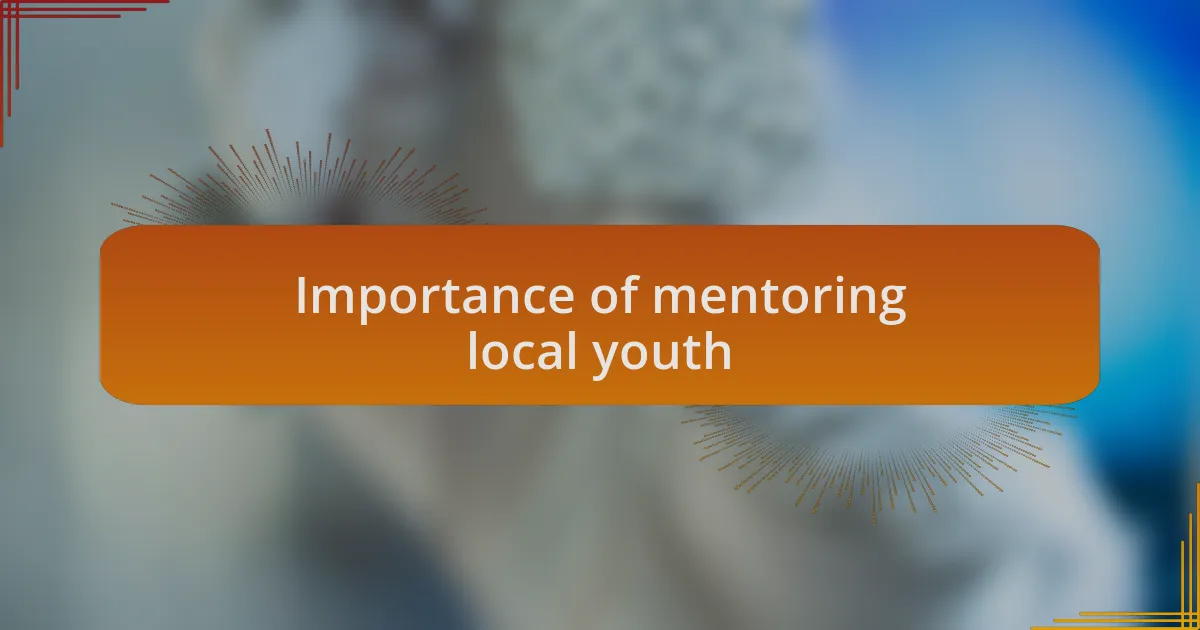
Importance of mentoring local youth
When mentoring local youth, I often observe how significant the impact of guidance can be on their development. I remember a young girl named Jenna, who struggled with self-esteem. Through our weekly sessions, I watched her transform from being hesitant to confidently presenting her ideas. It was a profound reminder that a little encouragement can go a long way in shaping a young person’s future.
Mentoring isn’t just about providing knowledge; it’s about building relationships. I’ve often found that these connections allow youth to navigate their own challenges more effectively. For instance, during one project, a group of teens shared their fears about the future—college, careers, and identity. Helping them understand that their journeys are unique and normal was a privilege, and seeing their outlook shift was incredibly fulfilling.
Moreover, investing time in local youth fosters a sense of community ownership. An example worth sharing is the neighborhood cleanup initiative we organized with the youth. It became clear that when they took pride in their environment, it bred a deeper commitment to their community. Have you ever considered how mentorship can ripple through generations? I believe it creates a legacy of responsibility and empowerment that benefits us all.
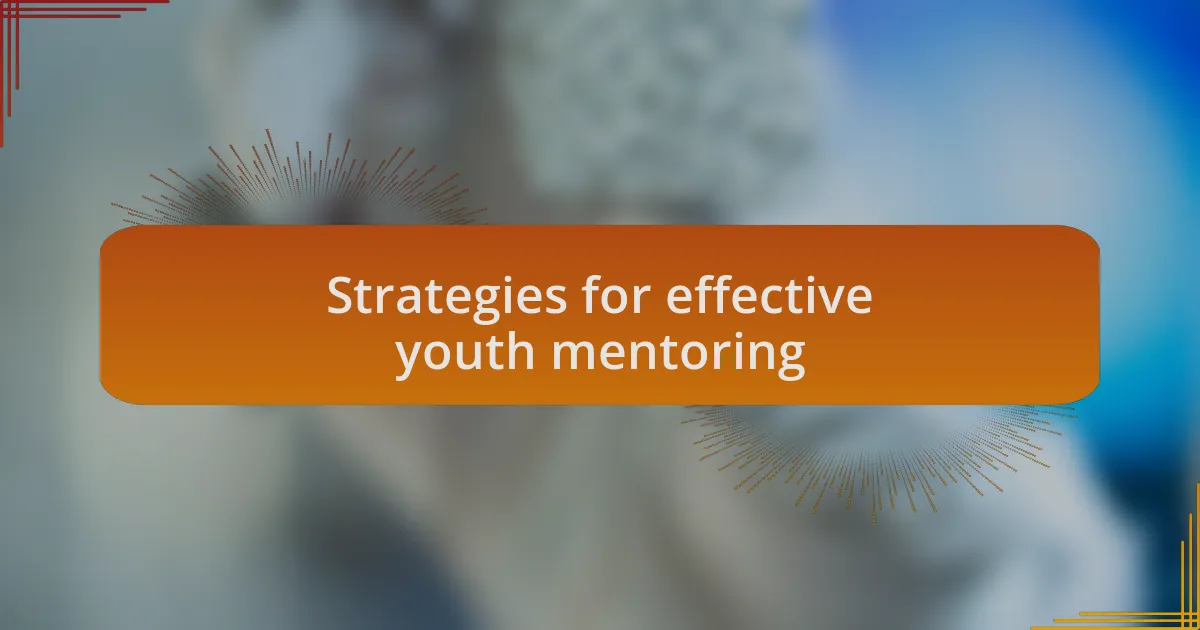
Strategies for effective youth mentoring
One effective strategy I’ve discovered in mentoring youth is to foster a growth mindset. I remember one session with a young man named Amir, who was frustrated with his math skills. Instead of simply correcting him, I encouraged him to see mistakes as learning opportunities. By shifting his perspective, not only did his grades improve, but his overall confidence blossomed. Are there moments in life when we need to reframe our challenges as stepping stones rather than stumbling blocks?
Creating an environment of trust is also crucial. I once had a mentee, Sarah, who was reluctant to share her dreams because she feared judgment. By listening actively and validating her feelings, she gradually opened up. It was such a rewarding experience to witness her share her aspirations, knowing that our consistent support helped her feel safe to express herself. Have you ever thought about how the right environment can unleash someone’s potential?
Lastly, I find that goal-setting can be an immensely powerful tool in mentoring. During one project, I guided a group to define their individual ambitions. We broke them down into actionable steps, and seeing the enthusiasm in their eyes as they checked off each milestone was incredibly heartwarming. How often do we undervalue the power of tangible goals in propelling us forward? It’s remarkable to see how clarity can ignite passion and drive among young people.
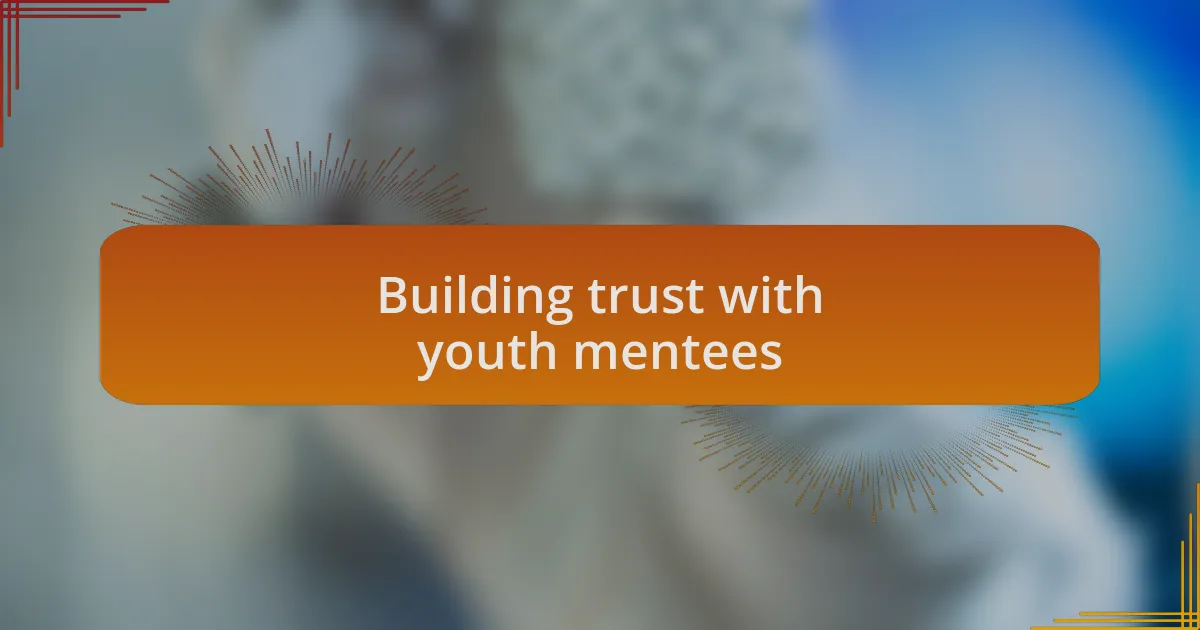
Building trust with youth mentees
Building trust with youth mentees is a delicate yet essential process. I remember working with a group of teens who struggled to believe in the support system around them. By consistently showing up, being present, and engaging in heartfelt conversations, I noticed the walls they had built around themselves slowly began to crumble. Isn’t it fascinating how simple acts of reliability can pave the way for deeper connections?
Establishing trust also means being vulnerable. One evening, I shared a personal story about my own struggles during my teenage years, and the room fell silent. I could see the surprise on their faces, reflecting their realization that I wasn’t just a mentor in a position of authority but also someone who understood their journey. It made me wonder—how can transparency inspire trust in ways we rarely expect?
Moreover, practicing empathy is vital in this trust-building journey. When a mentee shared his heartbreak over a friendship gone wrong, I ensured that my response was compassionate and understanding. I asked questions about his feelings instead of jumping to offer solutions. In that moment, I realized that truly listening opens a door to trust that few other actions can. Have you ever thought about how often we rush to fix problems instead of just holding space for someone’s feelings?
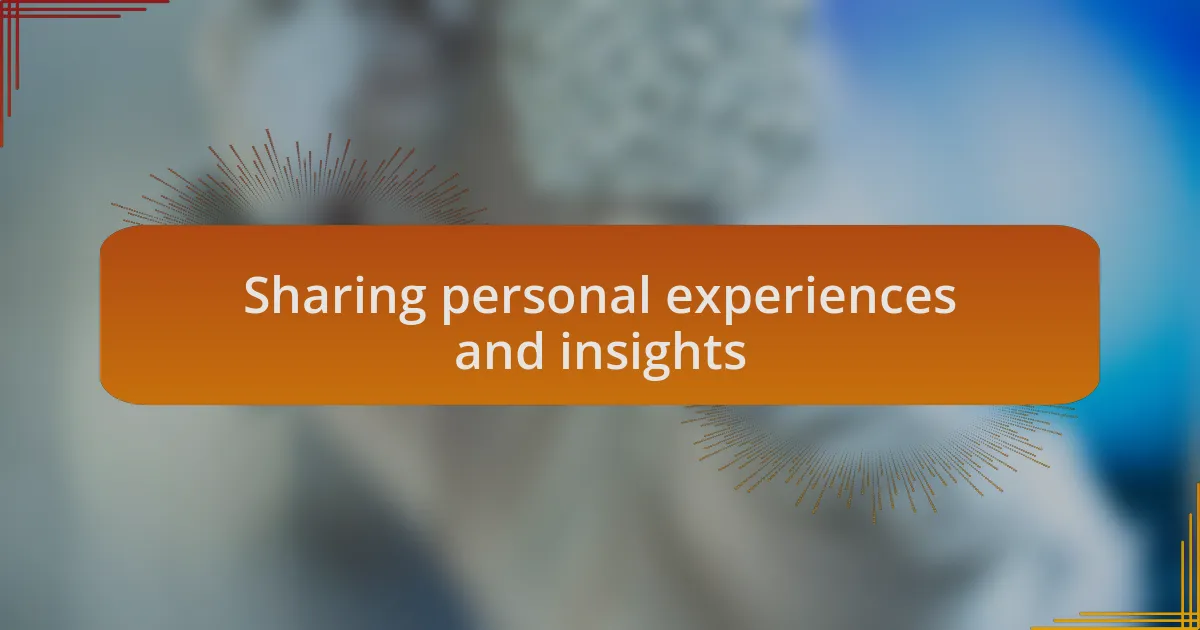
Sharing personal experiences and insights
Sharing my personal experiences with the youth I’ve mentored has been transformative for both them and me. One day, after a particularly tough session, a mentee approached me and shared how my story of overcoming self-doubt resonated with her. It hit me then—there’s immense power in vulnerability that can bridge gaps between generations. Have you ever considered how revealing our own journeys can ignite hope in others?
During my time mentoring, I often found that sharing insights about my failures proved just as impactful as discussing my successes. One young man, who struggled with academic pressure, connected deeply when I recounted a time I failed a crucial exam. Seeing him nod in understanding made me realize that failure is a shared experience, and sometimes, it’s what we learn from it that counts the most. Isn’t it refreshing to know that we’re not alone in our struggles?
I also cherish moments when I listen to their ideas and dreams, sharing how they inspire me to re-evaluate my own paths. When a mentee spoke passionately about wanting to start a community garden, I felt compelled to encourage that vision, reflecting on how their youthful optimism can breathe new life into projects. It’s a testament to how mutual sharing can create a vibrant exchange of ideas—one that celebrates growth in both directions. Have you thought about how the perspectives of the young can shift our own viewpoints in unexpected ways?
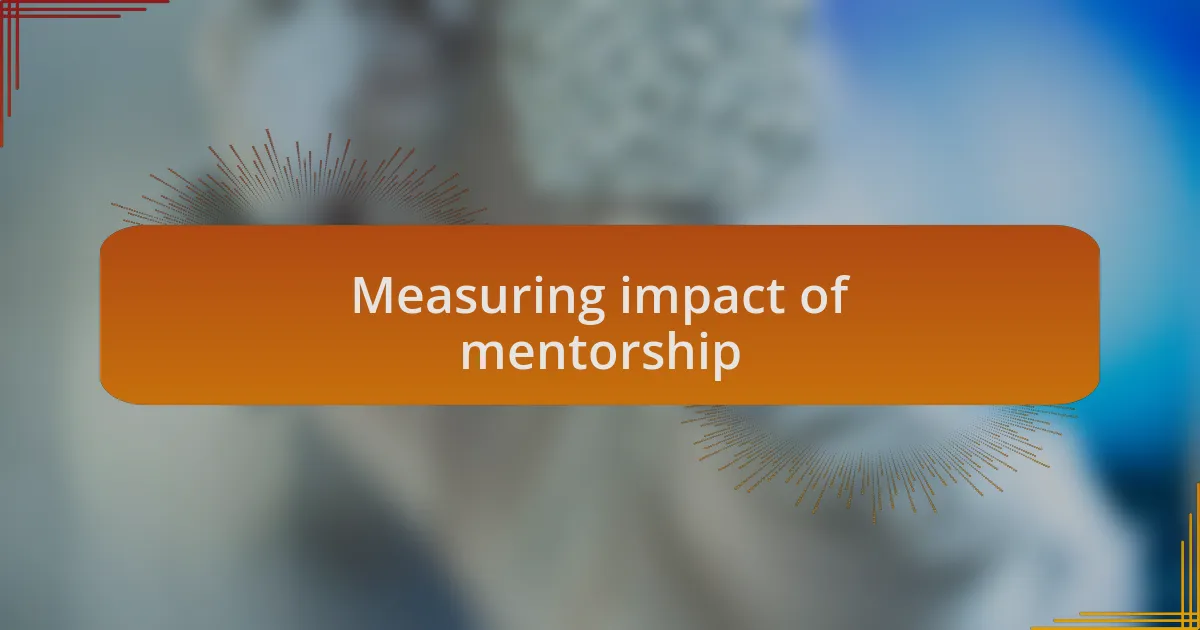
Measuring impact of mentorship
Measuring the impact of mentorship can sometimes feel like a daunting task, but I find that small changes often serve as the best indicators. For instance, one of my mentees showed tremendous growth when he began expressing his ideas more confidently during our discussions. I still remember the first time he took the initiative to lead a project; the pride in his eyes spoke volumes about his blossoming self-assurance. Have you observed similar transformations in the youth around you?
Surveys and feedback forms provide quantitative data, but I often lean on qualitative stories to understand the true effects of my mentorship. One particular experience stands out: a mentee who initially struggled with organization eventually organized a community event that drew over a hundred participants. Hearing her recount how she faced and conquered her fears made me realize that mentorship is not just about teaching skills but also about kindling belief in one’s potential. Does this resonate with your experiences in mentorship?
Another impactful method I like to use is goal-setting. I assist my mentees in creating tangible objectives, such as improving their grades or developing specific skills. When a mentee met her goal of volunteering for an hour each week, it was not just a number; it was a validation of her growth and commitment. Moments like these remind me that the value of mentorship is often hidden in the incremental steps toward personal success. Have you experienced those rewarding moments of progress with your mentees?
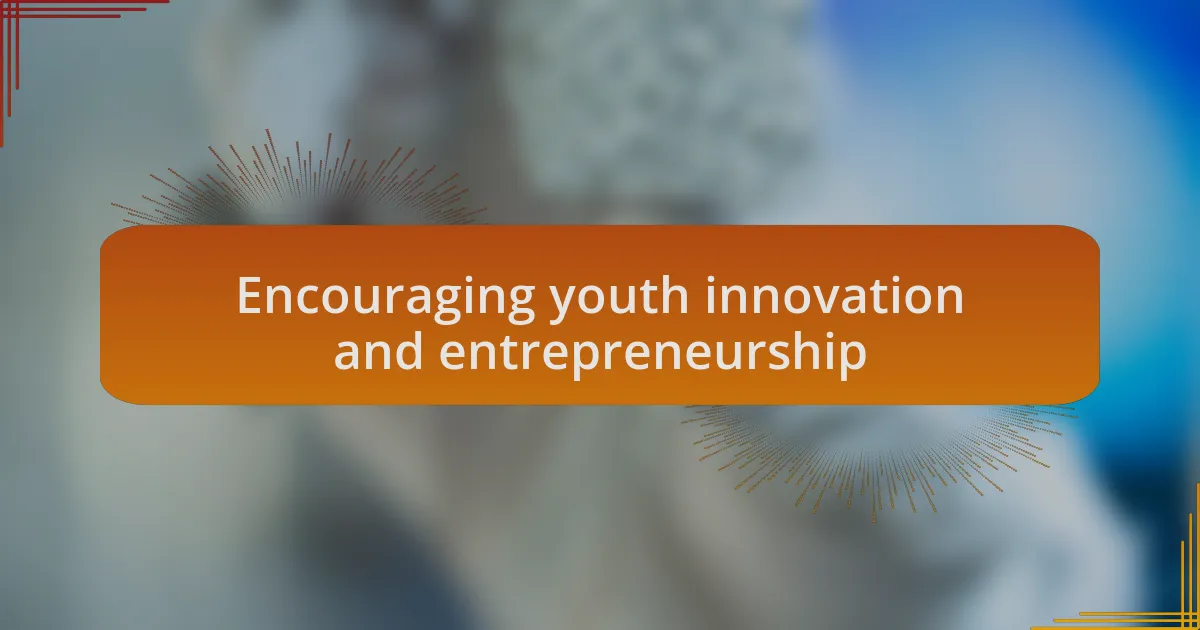
Encouraging youth innovation and entrepreneurship
Fostering youth innovation and entrepreneurship is about providing a safe space for creativity to flourish. I recall one evening spent in a community center, where I introduced a group of young people to basic business concepts through a fun brainstorming session. Watching their eyes light up with ideas—like a mobile app to help local farmers reach customers directly—reminded me of the power of youth imagination. Isn’t it incredible how a simple discussion can unlock such potential?
In my experience, mentorship plays a crucial role in this process. I once guided a young aspiring entrepreneur who initially felt overwhelmed by the thought of starting a small business. Through practical exercises and encouragement, she not only developed a solid business plan but also delivered a pitch at a local competition that left the audience inspired. Have you ever seen someone transform their self-doubt into passion before your eyes?
Furthermore, I’ve noticed that creating collaborative environments amplifies their drive. One summer, I organized hackathon-style workshops where youths teamed up to develop solutions for community issues. The sense of camaraderie and shared ambition propelled them to innovate in ways I had never anticipated. Have you ventured into collaboration with the youth you’re mentoring? The results are often astonishing when they work together, fueled by their diverse perspectives.